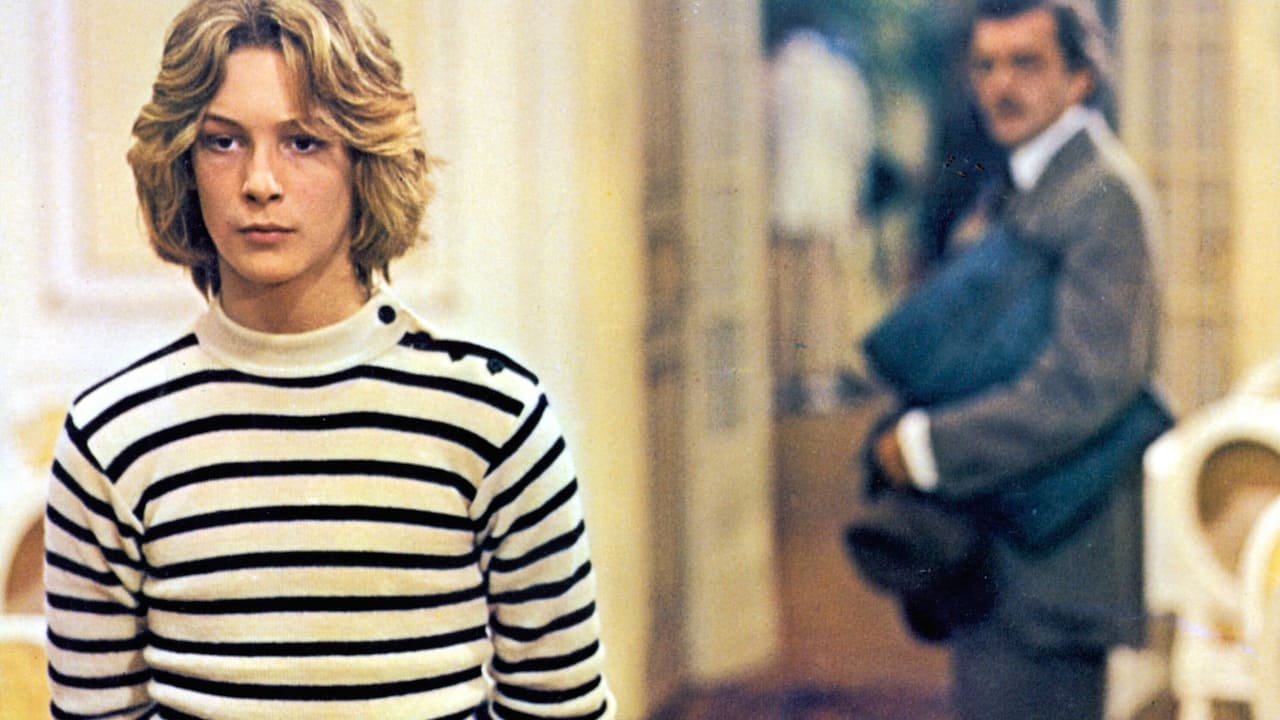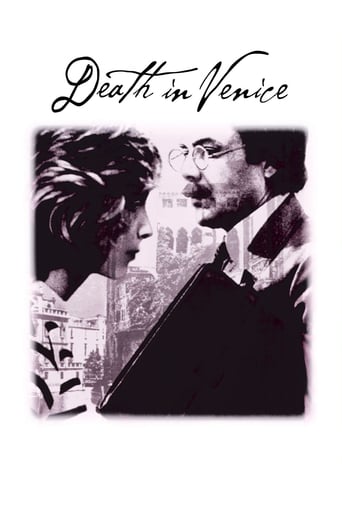

This is a movie about a man fantasizing about a young boy. Nothing more, though woven around sights of one of the most romantic cities in the world. I see no redeeming value in this semi-autobiographical story by Thomas Mann. I can't imagine there was any other reason to write/film it than to increase sympathy for men with these feelings. Pure propaganda, unadorned by any exploration of internal thought process, which might have served to explain his (seeming) struggle. If you want to see an entertaining movie about homosexuals, check out Capote. This is simply about a mans fascination with a good-looking youth. Risking people thinking I'm being homophobic, I just can't understand the rave reviews, or even the good reviews that ignore the central tenet of the movie. I should say only tenet - there's utterly no plot and little dialog. I'd be more upset if the movie wasn't so awful boring. Btw - the 3 stars were entirely due to the shots of Venice!
... View MoreI don't usually write reviews with spoilers, but it is nearly impossible to discuss this film without revealing some of its major plot points, especially since there are so few of them."Death in Venice" is based upon a Thomas Mann novel. It is said Mann was inspired when he heard of Gustav Mahler's death. Mann was gay and Mahler was presumed by many to be gay, despite his marriage and offspring. So, Mann created the story about Gustav Aschenbach, borrowing elements from Mahler's life and his own.Aschenbach is, like Mahler, a creator--specifically a writer. While in Venice, he is consumed by two things: his concern about his own health and his fascination with a fourteen-year-old boy. His focus on the boy becomes an obsession and that obsession takes up ninety percent of the film.Director Visconti--also a gay man--decided to make Aschenbach a composer. He also used some Mahler symphonies as background music.The other ten percent of the film are mundane happenings and Aschenbach's internal dialogue, with flashbacks that include philosophical discussions about art. (Does art arise from the intellect or the senses?) But these are minor, undeveloped diversions from the film's main themes. The cinematography is sometimes evocative of the works of William Turner or, more often, of Renoir. But the camera work often undermines the images, especially when Visconti repeatedly uses zoom to beat the viewer over the head with the obvious. The pace of the film is leisurely. That can be explained, in part, by the fact that the film takes place in the world of the leisure class. Aschenbach is living among those who are restrained and mannered. Starched collars and stiff behavior are the norm. But the languorous tempo only serves to accentuate the fact that this is a film in which very little actually happens. In the end, this film is not very entertaining. And its main themes have been explored much more effectively in other films.
... View MoreDeath in Venice comes from an obsession for a perfect beauty ending up in what we can understand as Wagner's conception of liebestod ( erotic (death). The Luchino Visconti version of Thomas Mann's novel is based on an uninspired composer Gustav Von Asenbach. However in the book he is a novelist who is old and resentful, his disposition takes him on a journey through the magnificent historic city of Venice. During his time there he becomes enchanted by Tadzio, a polish boy whom he perceives as the ideal conception of beautifulness. The back drop is of a city that's declining in an atmosphere of uncertainty as a mysterious plague (cholera) carries death to its inhabitants. This bizarre transformation of Venice is contrasted by the beauty of Tadzio.The movie is quite slow, but it appeals for its details that enhance and reward the attention paid to them. Such as the paused attitude of Achenbach interpreted by Dirk Bogarde, who is unobtrusive and formal in his behaviour. An undercurrent of emotions invade him in the presence of Tadzio. Aschenbach is a man of good manners and harsh convictions, but Tadzio makes him question his firmly held principals. Tormented by feelings he needs the attention of the boy, and considers doing something which is for him outrageous. An old man groomed to look younger disgusts him, Tadzio has become Gustavs obsessive desire and he concedes. The movies dialog is constrained but beyond this, emotion is added by what is not said but what is obvious, here it applies greater depth. These contrasts focus on the central point of this work of motion art. The essentials revolve around conflicts in the mind of Von Aschenbach as he perceives perfect beauty in a young man.Having read the book I can say that the director Luchino Visconti, shifts a few things from the context of the novel to a visual adaptation that works in general as the changes are convincing. Therefore we can understand the film in a form creating a perspective of the struggle Von Aschenbach has searching for reasons to liberate his conscience. In the movie he says that beauty comes and is created in the spirit, not from the senses but when he sees Tadzio for the first time a fleeting unelaborated sense is filling him for a finale of sexual passion, his resistive sense of morality is released to the winds.
... View MoreSome others here have written so eloquently and fully about this film's many virtues that I see no point in saying more about them. I shall instead say why I find it not quite flawless, but first I shall underline my appreciation of it by observing I love this film despite being intensely bored by some acclaimed films with little dialogue or action. Mostly I think this must come down to the film being such a rich visual treat, but hearing that some find it boring despite that, I wonder if this might not be a rare case where it is a great advantage to have read the novella first, as I did, for Mann's description of Aschenbach's developing and conflicting emotions is absolutely masterful. Perhaps this helps one feel as Aschenbach feels more than one could just from Bogarde's excellent acting.Visconti allowed himself more than two hours to bring to life a very short novel. There was thus none of the usual necessity to cut any of the novel, and since the latter is a masterpiece, every reason to be faithful to it. Nothing that matters has been cut and the film is generally faithful. Nevertheless, its only slight flaws come from being not faithful enough.The main change in the story is that Aschenbach is changed from a writer to a musician. The reasons are understandable and I don't think it matters much except that Visconti made it the basis for a series of flashbacks in which Aschenbach has slightly corny debates about the purpose of musical creation. I find these tiresome distractions.A lesser flaw for me is the choice of 16-year-old Björn Andrésen to play 14-year-old Tadzio. I realise from the numerous superlative remarks made about his beauty that most will disagree with me on this. I agree with others it was critical to the film's success that Tadzio's actor be beautiful and I can appreciate Andrésen's beauty enough to understand how Visconti's choice succeeded. Though personally I find him too pallid (and his hair too '70s for an otherwise wonderfully authentic depiction of 1911), my objection is not that he was not beautiful enough, but that it would have been easy and better to find an equally beautiful 14-year-old to play the role. There is quite a difference between boys of 14 and 16 and Mann had his reasons for depicting Tadzio as looking 14. Andrésen's rather feminine appearance for his age is a poor substitute for the more natural androgyny of 14. I think Mann's choice of 14 was intended both for the broad appeal of this quality and in considered juxtaposition to Aschenbach's age: the one near the beginning of his romantic sensibility while the other was at its end. Much to his credit, Visconti did set out to find a younger boy, so he was not making the ignoble concession to social correctness other directors have made under similar circumstances, and I would not mention it if the film was not otherwise so nearly perfect.As many appear still to be unaware of it, it may be interesting to mention that Death in Venice is partly a true story. Mann having already decided to write a story about a great writer who succumbs to passion for a youngster and to base the writer physically on the recently deceased composer Mahler, the rest of the story fell into place in detail when he arrived in Venice and promptly fell in love with a boy; in his own words, "nothing was invented." Gilbert Adair wrote a book on this called The Real Tadzio, exploring also the life of Wladyslaw Moes, who claimed to be the real boy (which I doubt for reasons I have explained in a review of it).Edmund Marlowe, author of Alexander's Choice, a story of similar but requited love, www.amazon.com/dp/1481222112
... View More